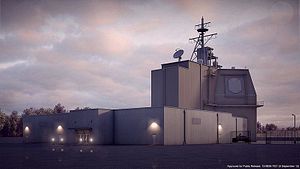Last week, Japan’s minister of defense, Takeshi Iwaya, apologized to the governor of Yamaguchi prefecture for how poorly the central government handled justifying the selection of Hagi city as a candidate site for the deployment of one of two land-based Aegis Ashore systems. Hagi city is one of two cities, along with Akita city in Akita prefecture, named as candidate sites. At the heart of the matter is the revelation of mistakes in the geographical survey conducted to select the prefecture as a site for deployment. There was a discrepancy in the Ministry of Defense’s data, which was based on data taken from Google Earth, and data from the government’s Geopolitical Information Authority of Japan. Iwaya had also apologized to the governor of Akita prefecture in mid-June for erroneous data in explanation materials presented to justify the selection of Akita city.
The survey mistake itself may not be fatal to deploying the Aegis Ashore system to the locale – the Ministry of Defense (MOD) was off by about 2 meters, and the mistakes were systematically biased toward making it more difficult to select the given site (the MOD’s data made the mountains appear steeper than they were, and high mountains can block the radio waves emitted by the radar of the missile defense system). What is problematic is the fact that a mistake occurred at all – that this faulty data was presented as trustworthy. Earning the local residents’ trust and understanding was already an impossibly difficult task; the central government’s mistakes in marshaling evidence to explain the site selection only increases the difficulty.
Local residents in Hagi city, Abu city (neighboring Hagi city), and Akita city have been opposed since the sites were named as candidates in June 2018 due to possible health concerns and fears about becoming a target of North Korean attack. They want to know why their cities were selected to host the Aegis systems. It is politically impossible for the MOD to answer that these cities were selected for convenience, because the Ground Self-Defense Force (GSDF) already owns land there, the Mutsumi training area in Yamagata and the Araya training area in Akita. However, as local opposition ramps up, it may be time for the government to consider alternative locations, even if it means purchasing new land. A new field survey to collect accurate data is unlikely to cool the opposition once trust in the central government has been lost.
The decision to deploy the system was made hastily by Prime Minister Shinzo Abe in December 2017, partly in reaction to increasing tension with North Korea as Pyongyang increased the tempo of its missile tests, and partly due to U.S. President Donald Trump’s pressure to “Buy American.” While the costs may have been grossly underestimated, the decision itself is a strategically sound decision, and one that the Abe administration should stick to, even as a superficial diplomatic détente descends on the Korean Peninsula.
As Jeffrey Hornung argued almost a year ago:
Japan can still benefit from a reinforced missile shield vis-à-vis North Korea. … While it is tempting to hope for the current trend of North Korean behavior to continue, until concrete steps are taken by Pyongyang to demonstrate it is not longer a threat to its neighbors, Japanese leaders must consider all the possible means to defend Japan from the North Korean threat, including the Aegis Ashore system.
Despite the summit pageantry of this spring, his warning still holds true.
Though originally scheduled for deployment in 2023, with existing delays, the Aegis Ashore system will likely not be operational until 2024 or even later.

































